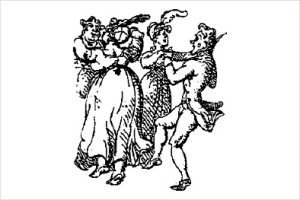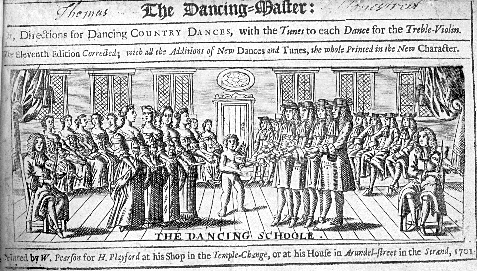 b. Norwich, 1623 d. London, 1686
b. Norwich, 1623 d. London, 1686
Music publisher and bookseller, clerk to the Temple Church and Vicar-Choral of St Paul’s Cathedral. In 1639 he was apprenticed for seven years to John Benson, a London publisher, and in 1647 became a member of the Yeomanry of the Stationers’ Company.
As a Royalist, Playford began publishing political tracts, culminating in “The Perfect Narrative of the Tryal of the King”. This was an age when music publishing was part of the more general field of book publishing, a situation changing by the time of his son Henry.
On 7th November 1650 he entered in the stationers’ registers “The English Dancing Master or Plaine and Easie Rules for the Dancing of Country Dances’, which was published in 1651. It is generally thought that this was his first musical publication but “A Musical Banquet” bears the mark of John Benson as well as his own and so there is some speculation that it may have been earlier. “The English Dancing Master”, with enlarged editions, continued until 1728, each ‘new edition’ often differing little from its predecessor, although new lessons may have been added and some taken away.
The Wighton Collection contains editions published between 1675 (5th ed.) and 1721 (17th ed.), as well as copies of the second and third volumes of “The Dancing Master”.
In the Wighton Collection there is also a first edition of “Apollo’s Banquet”.
The entry in the Wighton Database reads:
1st edn Wants title page (p. 1) which has been substituted in MS by text from an advertisement in Playford’s “Musick's Hand-Maid”, pp. 2–4 in MS. The airs are numbered 1 to 222, with the following irregularities: nos. 168 & 185 are each used twice for 2 different airs; nos 5, 6, 32, 49, 130, 163 & 221 are omitted. Nos. 205 & 219 are the same air under the same name. Nos. 31 & 44 are the same air under different names, as are 99 & 106, 72 & 119, 23 & 57. Nos. 176 & 200 are variant sets of the same air. The 84 pages of music are unnumbered.
Microfiche available.
John Playford published hymns and psalms and we have records of his personal feelings and ideals in introductions to his works.
An enormously important figure in the development of English music publication and a source of inspiration for Cecil Sharp’s English folk revival.
There is no exact record of Playford’s burial but it is of interest that Purcell wrote the “Elegy on my friend, Mr John Playford”.

Editions in the Wighton Collection
1st edn.
Wants title page (p. 1) which has been substituted in MS by text from an advertisement in Playford’s ‘Musick’s Hand-Maid”. pp. 2–4 in MS. The airs are numbered 1 to 222, with the following irregularities: nos. 168 & 185 are each used twice for 2 different airs; nos 5, 6, 32, 49, 130, 163 & 221 are omitted. Nos. 205 & 219 are the same air under the same name. Nos. 31 & 44 are the same air under different names, as are 99 & 106, 72 & 119, 23 & 57. Nos. 176 & 200 are variant sets of the same air. The 84 pages of music are unnumbered.
Microfiche available. (John Playford)
Apollo’s Banquet:
Containing instructions and variety of new tunes, ayres, jiggs, and several new Scotch tunes for the treble violin, to which is added the tunes of the newest French dances.
6th edn. 1690 (Henry Playford)
The 1st book of Apollo’s Banquet:
Containing instructions, and variety of new tunes, ayres, jiggs, minuets and several new Scotch tunes, for the treble violin, to which is added the tunes of the newest French dances, now in use at Court and in the dancing schools.
The 7th edn 1693 (Henry Playford)
Apollo’s Banquet. Select Tunes and Jiggs for the Treble-Violin
1st edn.
Wants title page (p. 1) which has been substituted in MS by text from an advertisement in Playford’s “Musick’s Hand-Maid”. pp. 2–4 in MS.
The airs are numbered 1 to 222, with the following irregularities: nos. 168 & 185 are each used twice for 2 different airs; nos 5, 6, 32, 49, 130, 163 & 221 are omitted. Nos. 205 & 219 are the same air under the same name. Nos. 31 & 44 are the same air under different names, as are 99 & 106, 72 & 119, 23 & 57. Nos. 176 & 200 are variant sets of the same air. The 84 pages of music are unnumbered.
Microfiche available.
For notes on author attribution, see 6th edn.
Short Rules and Directions for Practitioners on the Treble Violin
This is the first edition of “Apollo’s Banquet” and catalogued elsewhere as such. Conserved by Riley, Dunn and Wilson 1995.
Microfiche available.
A brief introduction to the skill of musick for song and viol. in 2 books
First book contains the grounds and rules of musick for song. Second book. Directions for the playing on the viol de gambo, and also on the treble violin.
The Musical Companion
Containing catches and rounds for 3 voyces, and dialogues, glees, ballads and ayres, in several varieties, some for 2, 3, 4 voyces.
In 2 parts. (wants title of 1st part, and pp. 123–28, 150, 152 and 175–6 of 2nd part).
The Musical Companion
Containing catches and rounds for 3 voyces, and dialogues, glees, ayres and songs for 2, 3 and 4 voyces, in 2 books.
Microfiche available.
Musick’s Hand-Maid
Lessons and instructions for the virginals or harpsichord.
The Theater of Music
or, a choice collection of the newest and best songs sung at the Courts and public theatres, the words composed by the most ingenious wits of the age, and set to music by the masters in that science, with a theorbo-bass to each song for the theorbo, or bass-viol, also symphonies and retornels in 3 parts to several of them for the violins and flutes. In 4 books.
Microfiche available.
The Whole Book of Psalms
With the usual hymns and spiritual songs, together with all the ancient and proper tunes sung in churches, with some of later use, compos’d in 3 parts. 15th edn.

